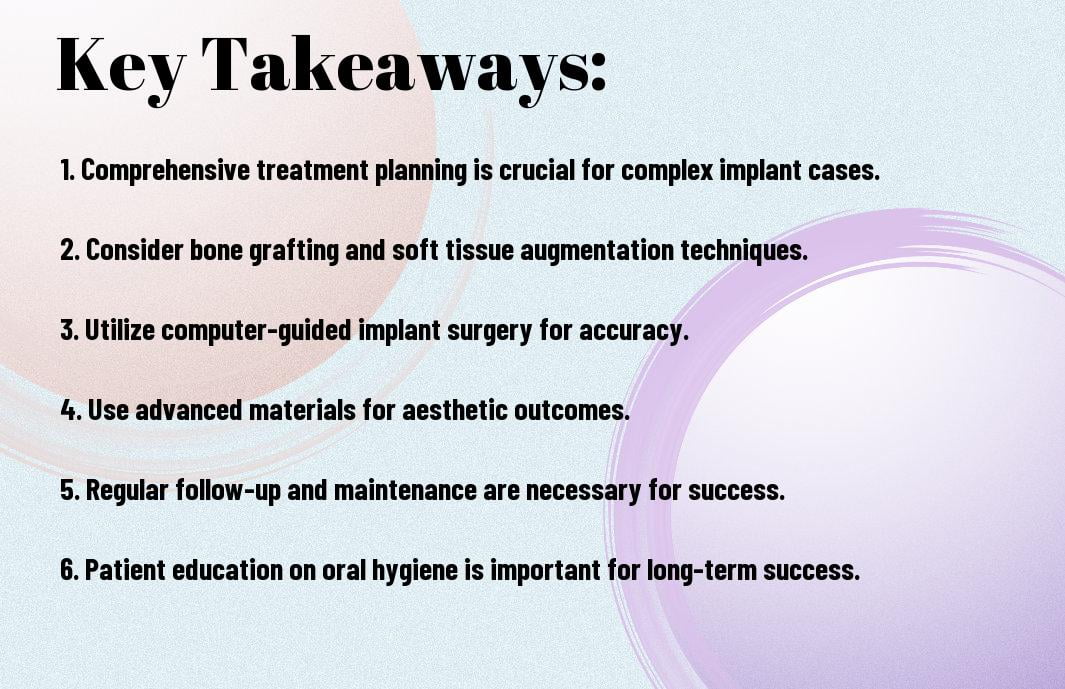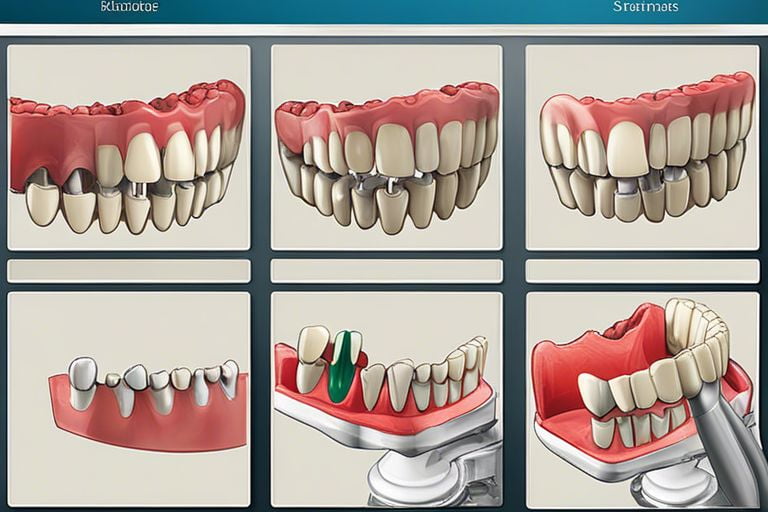Many individuals facing complex dental implant cases often require specialized care and treatment to restore their oral health and functionality. These cases can be challenging due to various factors such as bone loss, multiple missing teeth, or failed previous implant attempts. In such situations, it is crucial to consider rehabilitation options that are tailored to each patient’s unique needs. By exploring advanced techniques and technologies, dental professionals can successfully address the complexities and provide patients with effective solutions for their dental implant challenges. This blog post will examine into various rehabilitation options available for individuals with complex dental implant cases, shedding light on the benefits, risks, and outcomes associated with each approach.
Key Takeaways:
- Collaborative Approach: Complex dental implant cases often require a multidisciplinary approach involving prosthodontists, oral surgeons, and periodontists for a successful rehabilitation process.
- Advanced Technologies: Utilizing advanced technologies such as 3D imaging, computer-aided design/computer-aided manufacturing (CAD/CAM), and digital smile design can aid in planning and executing complex dental implant procedures.
- Customized Treatment Plans: Each complex dental implant case is unique, requiring a tailored treatment plan that considers the patient’s specific needs, jaw structure, bone density, and overall dental health for optimal outcomes.
Assessing Complex Dental Implant Cases
Identifying Common Complications
A thorough assessment of complex dental implant cases begins with identifying common complications that may arise during the implant process. Complications such as infection, implant failure, bone loss, and nerve damage can significantly impact the success of the treatment and must be carefully evaluated.
Diagnostic Tools and Imaging Techniques
Identifying the extent of damage and planning appropriate treatment for complex dental implant cases requires the use of advanced diagnostic tools and imaging techniques. X-rays, CT scans, and 3D imaging technologies are invaluable in providing detailed information about the bone structure, nerve location, and surrounding tissues to ensure a precise and effective treatment plan.
The use of digital impressions and computer-aided design (CAD) software can also enhance the accuracy of implant placement and prosthesis design, leading to improved outcomes for complex cases. Collaboration with specialists such as radiologists and prosthodontists is vital to leverage these diagnostic tools effectively.
Pre-Surgical Considerations
Clearly, before launching on a complex dental implant case, several pre-surgical considerations need to be addressed to ensure the success of the procedure.
Bone Grafting and Regeneration Options
Options for bone grafting and regeneration play a crucial role in cases where the existing bone volume is insufficient to support dental implants. Various techniques such as autogenous bone grafts, allografts, xenografts, and alloplastic materials can be utilized to augment bone volume and enhance osseointegration.
Soft Tissue Management Strategies
Any comprehensive treatment plan for complex dental implant cases should include strategies for managing soft tissues around the implant sites. Adequate soft tissue thickness and keratinized mucosa are vital for long-term implant success, emphasizing the importance of proper soft tissue management.
The use of techniques such as connective tissue grafts, free gingival grafts, and tunneling procedures can help optimize soft tissue outcomes and create a favorable environment for implant placement. Attention to detail in soft tissue management can significantly impact the aesthetic outcome and stability of dental implants.
Advanced Surgical Techniques
- Zygomatic and Pterygoid Implants
Zygomatic and Pterygoid Implants
Many cases of severe bone resorption or inadequate bone density in the maxilla may not be suitable for traditional implant placement. In such complex cases, Zygomatic and Pterygoid implants provide a viable solution. These implants anchor into the zygomatic bone or the pterygoid process, providing stable support for full-arch restorations without the need for bone grafting.
- Navigated Implant Surgery
Navigated Implant Surgery
Advanced navigational technology has revolutionized implant surgery by enhancing precision and accuracy. For instance, real-time imaging and virtual treatment planning allow for safer navigation through critical anatomical structures, reduced surgical time, and improved implant placement accuracy.
Prosthodontic Rehabilitation Approaches
Customized Abutment Design
For complex dental implant cases, customized abutment design plays a crucial role in ensuring a precise and stable foundation for the prosthetic restoration. Any discrepancies in the abutment design can lead to misalignment of the final restoration, affecting both aesthetics and function. It is crucial to work closely with a skilled prosthodontist to craft abutments that match the patient’s unique oral anatomy and implant placement.
Material Considerations for Aesthetics and Function
Material selection for dental prosthetics is critical in achieving both aesthetic appeal and optimal functionality for complex implant cases. The choice of materials such as zirconia, titanium, or PFM (porcelain-fused-to-metal) can impact the final outcome in terms of strength, durability, and natural appearance. Design considerations must prioritize the patient’s bite force, oral habits, and desired aesthetics to determine the most suitable material for the prosthetic restoration.
Post-Rehabilitation Care
Long-Term Maintenance Protocols
Maintenance of dental implants is crucial for their longevity and success. Your dentist will provide you with a personalized maintenance plan, including regular check-ups and cleanings. It is vital to follow good oral hygiene practices at home and schedule routine maintenance appointments to ensure the health of your implants for years to come.
Managing Future Complications
One of the key aspects of post-rehabilitation care is managing potential complications that may arise with dental implants. For instance, peri-implantitis, an infection around the implant, can lead to implant failure if not addressed promptly. Your dentist will monitor your implants for any signs of complications and provide appropriate treatment to prevent further issues.
Conclusion
Ultimately, patients with complex dental implant cases have a range of rehabilitation options available to restore their oral health and aesthetics. By working closely with an experienced prosthodontist or oral surgeon, individuals can explore solutions such as bone grafting, sinus lifts, zygomatic implants, and digital smile design to achieve optimal outcomes. It is crucial for patients to undergo thorough assessments and discuss their goals with their dental team to determine the most suitable treatment plan tailored to their unique needs. With advancements in technology and techniques, even the most challenging cases can be successfully rehabilitated, providing patients with functional and aesthetically pleasing smiles for years to come.
FAQ
Q: What are complex dental implant cases?
A: Complex dental implant cases refer to situations where the patient has insufficient bone structure, gum disease, or other issues that make traditional dental implant procedures difficult. These cases often require advanced treatment planning and specialized techniques to achieve successful outcomes.
Q: What are the rehabilitation options for complex dental implant cases?
A: Rehabilitation options for complex dental implant cases may include bone grafting procedures to build up the jawbone, sinus lifts to create space for implants in the upper jaw, and the use of zygomatic implants for patients with severe bone loss. Other options may involve computer-guided implant placement, All-on-4 implants, or a combination of different techniques to ensure optimal results.
Q: How can I find the right specialist for my complex dental implant case?
A: When looking for a specialist to handle your complex dental implant case, it is important to choose a prosthodontist or oral surgeon with extensive experience in treating complex cases. Look for a professional who is board-certified, has a high success rate with similar cases, and can provide you with patient testimonials or case studies. Additionally, consider seeking a second opinion to ensure you are comfortable with the treatment plan and approach recommended by the specialist.







